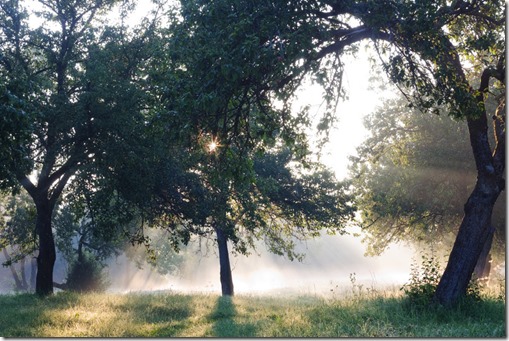
The End of Creation
 To believe in God is to believe that life is going somewhere.
To believe in God is to believe that life is going somewhere.
It is to believe that the universe is part of a grand narrative with a beginning, middle, and end. And by “end” I don’t mean “the point after which there is nothing,” as in the end of a movie or end of a book. Rather, I mean “end” as in purpose, destination, fulfillment.
I am talking, of course, about the God that is revealed to us in Scripture. There are other belief systems that include some concept of deity that view the world differently e.g. as a recurring cycle of repeated events.
And then there are the atheistic belief systems which hold that the universe is just a mix of random events related only in a cause-and-effect way but with no over-arching sense of direction, intent, or purpose.
There is no beginning, no ending.
Just a constant “is.”
The Bible presents the creation and Creator differently. That’s not to say, however, that all Christianity presents it the way that the Bible does.
There is a large branch of Christianity that has a pretty fatalistic view of the end of things. Interestingly, this branch actually diverges to form two radically different branches that in most things are opposed to each other.
I’m speaking about the far right forms of conservative Christianity and the far left forms of liberal Christianity. Both have a very pessimistic view of the end of things.
Far right conservatives embrace an eschatology—or theology of end times—in which this world is too far gone for God to do anything with other than destroy it and start all over with a brand new earth.
This old earth is corrupt and under the total control of Satan, and in the end Jesus will have to return and put an end to everything. First he will whisk all the Christians away in what they call “the rapture,” and then everything will literally turn to hell on earth.
When he’s had enough he’ll return, kill all the evil people, banish the devil and all his demons to earth, and replace this present earth with a much better version.
Apparently even that much better version has a shelf life, because in the end all that’s left is heaven. That’s where the story ends, because heaven is perfect and therefore unchangeable, so even though it—and all of us who make it there—are eternal, nothing can change because any change from perfection is by definition a change to imperfection.
So life in eternity in heaven has no ending, just a constant “is.”
Kind of like the atheists believe, except in the future and with a God.
The far left liberal branch essentially has no eschatology at all. There is no end in mind except for the ongoing struggle for peace, justice, equality, and community.
It is an end in that these are the things that Christians are to pursue in their brief sojourns on earth, but that the earth would truly be rid of war, injustice, discrimination and estrangement—well, that’s just idealism run amuck.
We’ll always have the poor, they misinterpret Jesus as saying, and lions will never really eat straw as the Old Testament prophets said metaphorically.
Because it’s just a metaphor. (I hate when people say that.)
This is the way it is and will always be.
But isn’t this just another form of the constant “is”?
Revelation speaks of a new heaven and new earth, but not in the sense of throwing away the old and bringing in something new, but in the sense of redeeming the old so that it is transformed into something infinitely better.
Paul speaks of a new creation, and we need to be clear that he isn’t speaking about a return to the conditions before the Fall.
The biblical vision isn’t a form of nostalgia, in which God is going to bring back the good old days.
No, there is a reason the story of Eden comes “in the beginning,” because that’s all it was ever meant to be—a starting point to a story that has its fulfillment in the reign of Christ on earth as he is in heaven.
Photo by © Can Stock Photo Inc. / aleksask
 I am a lifelong student of the Bible, and have been a pastor for over twenty-five years. My desire through this blog is to help people see things in the intersection of Scripture and real life that they might have missed. The careless handling of the Bible is causing a lot of problems in our churches and our culture--and is literally turning people away from the church, and, sometimes, God. I hope to treat Scripture with the respect it deserves, and, even if you don't agree with what I say, give you some insight.
Feel free to leave a comment. I promise to respond to you. All I ask is that you be respectful in your comments.
I am a lifelong student of the Bible, and have been a pastor for over twenty-five years. My desire through this blog is to help people see things in the intersection of Scripture and real life that they might have missed. The careless handling of the Bible is causing a lot of problems in our churches and our culture--and is literally turning people away from the church, and, sometimes, God. I hope to treat Scripture with the respect it deserves, and, even if you don't agree with what I say, give you some insight.
Feel free to leave a comment. I promise to respond to you. All I ask is that you be respectful in your comments. 
Connect with Me